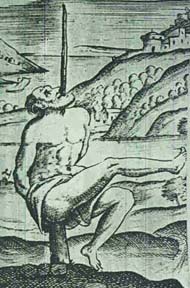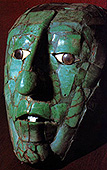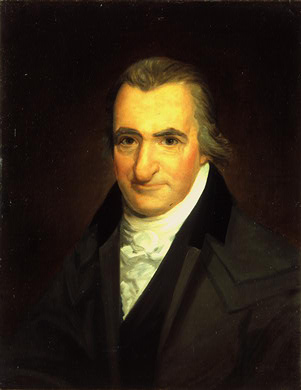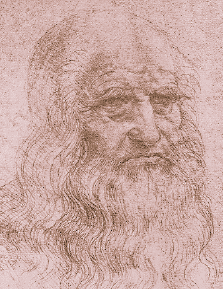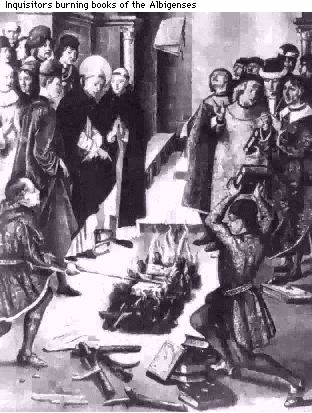MY RELIGIOUS VIEWS.


INTERNET INFIDELS
 "I have found Christian dogma unintelligible. Early in life I absented myself from Christian assemblies."
"I have found Christian dogma unintelligible. Early in life I absented myself from Christian assemblies."
[Benjamin Franklin, in _Toward The Mystery_]

![]() I have examined all the known superstitions of the Word, and I do not find in our particular superstition of Christianity one redeeming feature. They are all alike, founded on fables and mythology. Millions of innocent men, women and children, since the introduction of Christianity, have been burnt, tortured, fined and imprisoned. What has been the effect of this coercion? To make one half the world fools and the other half hypocrites; to support roguery and error all over the world ... The clergy converted the simple teachings of Jesus into an engine for enslaving mankind ... to filch wealth and power to themselves. [They], in fact, constitute the real Anti-Christ.
I have examined all the known superstitions of the Word, and I do not find in our particular superstition of Christianity one redeeming feature. They are all alike, founded on fables and mythology. Millions of innocent men, women and children, since the introduction of Christianity, have been burnt, tortured, fined and imprisoned. What has been the effect of this coercion? To make one half the world fools and the other half hypocrites; to support roguery and error all over the world ... The clergy converted the simple teachings of Jesus into an engine for enslaving mankind ... to filch wealth and power to themselves. [They], in fact, constitute the real Anti-Christ.
Thomas Jefferson
 "There is no opinion, however absurd, which men will not readily embrace as soon as they can be brought to the conviction that it is generally adopted."
"There is no opinion, however absurd, which men will not readily embrace as soon as they can be brought to the conviction that it is generally adopted."
 "What harm would it do, if a man told a good strong lie for the sake of the good and for the Christian church [...]a lie out of necessity, a useful lie, a helpful lie, such lies would not be against God, he would accept them. --Martin Luther cited by his secretary, in a letter in Max Lenz, ed., Briefwechsel Landgraf Phillips des Grossmüthigen von Hessen mit Bucer, vol.I."
"What harm would it do, if a man told a good strong lie for the sake of the good and for the Christian church [...]a lie out of necessity, a useful lie, a helpful lie, such lies would not be against God, he would accept them. --Martin Luther cited by his secretary, in a letter in Max Lenz, ed., Briefwechsel Landgraf Phillips des Grossmüthigen von Hessen mit Bucer, vol.I."
 Long Live Queen James-- While riding through the bustling streets of London from 1603 to 1621, one was liable to hear the shout "Long live Queen James!" King James I of England and VI of Scotland was so open about his homosexual love affairs that an epigram had been circulated which roused much mirth and nodding of the heads: Rex fuit Elizabeth: nunc est regina Jacobus—"Elizabeth was King: now James is Queen."
Long Live Queen James-- While riding through the bustling streets of London from 1603 to 1621, one was liable to hear the shout "Long live Queen James!" King James I of England and VI of Scotland was so open about his homosexual love affairs that an epigram had been circulated which roused much mirth and nodding of the heads: Rex fuit Elizabeth: nunc est regina Jacobus—"Elizabeth was King: now James is Queen."
Education, The Churches and. J. McCabe, Rationalists Encyclopaedia The legend that Christianity "gave the world schools," which is still repeated even by apologists who consider themselves above the popular class, is, like similar claims in regard to slavery, philanthropy, purity, etc., the exact opposite of the historical facts as they are recorded in every manual of the history of education published since the middle of the last century. Indeed, the Roman system of free education had been described repeatedly since the classical revival of the fifteenth century, and even in Christian circles every biography of Augustine of Hippo had described how he found free pagan schools, primary and secondary, even in the smaller towns of Africa. In earlier civilizations a good deal of schooling had been provided for boys (occasionally girls) of the middle class, as we find in Egyptian and Babylonian remains, but they all, including Greece, regarded the education of the workers as superfluous. Under the influence of the Stoic-Epicureans, long before bishops had the least influence, the Roman Emperors created a system of schools, maintained by the municipalities, for all freeborn children. By the fourth century the "ladder of education" (free to all) stretched, in all parts of the Empire, from the simple primary school, often in the open air, through secondary schools to a sort of university at Rome (and in a few other cities). See the details in Laurie's Historical Survey of Pre-Christian Education (1900) or any modern manual. These schools, in which the text-books were, naturally, Pagan literature, were offensive and dangerous to the Church, and the fact that in so intellectually busy a city as Alexandria the Christians opened a few small schools rather reminds us of the fable of the fly on the chariot - wheel when we are asked to regard this as the beginning of education. The Fathers were, in fact, overwhelmingly opposed to education and expressed a contempt for profane knowledge. "After Jesus Christ," said Tertullian, "all curiosity is superfluous."
 The next wave of religious Rationalism occurred in Germany under the influence of Hegel, who held that a religious creed is a halfway house on the road to a mature philosophy, the product of a reason that is still under the sway of feeling and imagination. This idea was taken up and applied with learning and acuteness to the origins of Christianity by David Friedrich Strauss (1808-74), who published in 1835, at the age of 27, a remarkable and influential three-volume work, Das Leben Jesu (The Life of Jesus, Critically Examined, 1846). Relying largely on internal inconsistencies in the Synoptic Gospels, Strauss undertook to prove these books to be unacceptable as revelation and unsatisfactory as history. He then sought to show how an imaginative people innocent of either history or science, convinced that a Messiah would appear, and deeply moved by a unique moral genius, inevitably wove myths about his birth and death, his miracles, and his divine communings. (see also Index: Hegelianism)
The next wave of religious Rationalism occurred in Germany under the influence of Hegel, who held that a religious creed is a halfway house on the road to a mature philosophy, the product of a reason that is still under the sway of feeling and imagination. This idea was taken up and applied with learning and acuteness to the origins of Christianity by David Friedrich Strauss (1808-74), who published in 1835, at the age of 27, a remarkable and influential three-volume work, Das Leben Jesu (The Life of Jesus, Critically Examined, 1846). Relying largely on internal inconsistencies in the Synoptic Gospels, Strauss undertook to prove these books to be unacceptable as revelation and unsatisfactory as history. He then sought to show how an imaginative people innocent of either history or science, convinced that a Messiah would appear, and deeply moved by a unique moral genius, inevitably wove myths about his birth and death, his miracles, and his divine communings. (see also Index: Hegelianism)
 If a miracle is by definition utterly improbable, then it is far more probable that our senses have deceived us or that those whose testimony leads us to believe the miracle either deceived us or were deceived themselves by other witnesses or by their senses. David Hume
If a miracle is by definition utterly improbable, then it is far more probable that our senses have deceived us or that those whose testimony leads us to believe the miracle either deceived us or were deceived themselves by other witnesses or by their senses. David Hume
 When we were weaned from our mother's tit most of us were forced to suckle from a theological pacifier. drsancho
When we were weaned from our mother's tit most of us were forced to suckle from a theological pacifier. drsancho
 You believe in the Bible from the accident of birth, and the Turks believe in the Koran from the same accident, and each call the other infidel. Thomas Paine.
You believe in the Bible from the accident of birth, and the Turks believe in the Koran from the same accident, and each call the other infidel. Thomas Paine.
 I believe that any system of religion that has anything in it that shocks the mind of a child cannot be a true system. Thomas Paine
I believe that any system of religion that has anything in it that shocks the mind of a child cannot be a true system. Thomas Paine
 Theologians are not competent to interpret the doctrines contained in the prophetically revealed law. For this, reason must be employed.-Averroes-
Theologians are not competent to interpret the doctrines contained in the prophetically revealed law. For this, reason must be employed.-Averroes-
 With 'Pascal's wager' he uses probabilistic and mathematical arguments but his main conclusion is that If God does not exist, one will lose nothing by believing in him, while if he does exist, one will lose everything by not believing. ...we are compelled to gamble... -Pascal, 17th century-
With 'Pascal's wager' he uses probabilistic and mathematical arguments but his main conclusion is that If God does not exist, one will lose nothing by believing in him, while if he does exist, one will lose everything by not believing. ...we are compelled to gamble... -Pascal, 17th century-
 "In many respects, says Montaigne [1533 - 1592], moral as well as physical, the cannibals live more sensibly than we do....they have a government of sorts, but not one that systematically robs and starves the helpless; they may eat their enemies, but do not burn them alive or torture them to death over doctrinal trivia.... Twenty years ago, in attending the Montreal Expo, I dropped in to the Canadian Indian exhibit, where the walls were covered with printed statements expressing the exhibitors' opinion of their white visitors. I remember nothing of the actual wording, but what was said in effect was: You conquered us, not fairly in battle but by infecting us with your foul diseases; you stole our land and shut us up into open-air cages; you trapped the animals and burnt the forests we depended on for food and shelter; worst of all, you robbed us of our Great Spirit and put your own horrible scarecrow in its place." -Northrop Frye 1912 - 1991.-
"In many respects, says Montaigne [1533 - 1592], moral as well as physical, the cannibals live more sensibly than we do....they have a government of sorts, but not one that systematically robs and starves the helpless; they may eat their enemies, but do not burn them alive or torture them to death over doctrinal trivia.... Twenty years ago, in attending the Montreal Expo, I dropped in to the Canadian Indian exhibit, where the walls were covered with printed statements expressing the exhibitors' opinion of their white visitors. I remember nothing of the actual wording, but what was said in effect was: You conquered us, not fairly in battle but by infecting us with your foul diseases; you stole our land and shut us up into open-air cages; you trapped the animals and burnt the forests we depended on for food and shelter; worst of all, you robbed us of our Great Spirit and put your own horrible scarecrow in its place." -Northrop Frye 1912 - 1991.-
 "All great truths begin as blasphemies." Shaw
"All great truths begin as blasphemies." Shaw
 Emerson's "Address at Divinity College," Harvard University, in 1838 was another challenge, this time directed against a lifeless Christian tradition, especially Unitarianism as he had known it. He dismissed religious institutions and the divinity of Jesus as failures in man's attempt to encounter deity directly through the moral principle or through an intuited sentiment of virtue. This address alienated many, left him with few opportunities to preach, and resulted in his being ostracized by Harvard for many years.-Ralph Waldo Emerson-
Emerson's "Address at Divinity College," Harvard University, in 1838 was another challenge, this time directed against a lifeless Christian tradition, especially Unitarianism as he had known it. He dismissed religious institutions and the divinity of Jesus as failures in man's attempt to encounter deity directly through the moral principle or through an intuited sentiment of virtue. This address alienated many, left him with few opportunities to preach, and resulted in his being ostracized by Harvard for many years.-Ralph Waldo Emerson-
 One of the earliest women scientists we have documentary evidence for, Hypatia was the daughter of Theon, a mathematician and astronomer at the Museum in Alexandria. Her refusal to convert to Christianity resulted in her murder. Fanatical monks took it upon themselves to remove her. She died violently. She was dragged to her death by a Christian mob who pulled her from her classroom into the streets where they peeled her to death with oyster shells. -She wrote that- All formal dogmatic religions are fallacious and must never be accepted by self-respecting persons as final. Reserve your right to think, for even to think wrongly is better than not to think at all. To teach superstitions as truth is a most terrible thing. -Hypatia of Alexandria Mathematics/Philosophy b. Egypt 370-415-
One of the earliest women scientists we have documentary evidence for, Hypatia was the daughter of Theon, a mathematician and astronomer at the Museum in Alexandria. Her refusal to convert to Christianity resulted in her murder. Fanatical monks took it upon themselves to remove her. She died violently. She was dragged to her death by a Christian mob who pulled her from her classroom into the streets where they peeled her to death with oyster shells. -She wrote that- All formal dogmatic religions are fallacious and must never be accepted by self-respecting persons as final. Reserve your right to think, for even to think wrongly is better than not to think at all. To teach superstitions as truth is a most terrible thing. -Hypatia of Alexandria Mathematics/Philosophy b. Egypt 370-415-

 Sigmund Freud, where he writes that the man named Moses was not Jewish but a monotheistic black Egyptian. In addition Sigmund Freud (1856-1939) drew on Darwinian themes when he discussed religion in terms of the "primal horde." According to Freud, belief in God constitutes a regression to a childlike state in which helpless man projects upon nature the image of a comforting father-figure.
Sigmund Freud, where he writes that the man named Moses was not Jewish but a monotheistic black Egyptian. In addition Sigmund Freud (1856-1939) drew on Darwinian themes when he discussed religion in terms of the "primal horde." According to Freud, belief in God constitutes a regression to a childlike state in which helpless man projects upon nature the image of a comforting father-figure.
"My feelings as a Christian points me to my Lord and Savior as a fighter. It points me to the man who once in loneliness, surrounded by a few followers, recognized these Jews for what they were and summoned men to fight against them and who, God’s truth! was greatest not as a sufferer but as a fighter. In boundless love as a Christian and as a man I read through the passage which tells us how the Lord at last rose in His might and seized the scourge to drive out of the Temple the brood of vipers and adders. How terrific was His fight for the world against the Jewish poison. To-day, after two thousand years, with deepest emotion I recognize more profoundly than ever before the fact that it was for this that He had to shed His blood upon the Cross. As a Christian I have no duty to allow my self to be cheated, but I have the duty to be a fighter for truth and justice… And if there is anything which could demonstrate that we are acting rightly it is the distress that daily grows . For as a Christian I have also a duty to my own people." –Adolf Hitler, in a speech on 12 April 1922 (Norman H. Baynes, ed. The Speeches of Adolf Hitler, April 1922-August 1939, Vol. 1 of 2, pp. 19-20, Oxford University Press, 1942)
 Valla, Lorenzo, Latin LAURENTIUS VALLENSIS (b. 1407, Rome, Papal States [Italy]--d. Aug. 1, 1457, Rome), Italian humanist, philosopher, and literary critic who attacked medieval traditions and anticipated views of the Protestant reformers.
Valla, Lorenzo, Latin LAURENTIUS VALLENSIS (b. 1407, Rome, Papal States [Italy]--d. Aug. 1, 1457, Rome), Italian humanist, philosopher, and literary critic who attacked medieval traditions and anticipated views of the Protestant reformers.
His Declamatio (Treatise of Lorenzo Valla on the Donation of Constantine), written in 1440, attacked the crude Latin of its anonymous author and from that observation argued that the document could not possibly have dated from the time of Constantine. Valla reduced Aristotle's nine "categories" to three (substance, quality, and action, which corresponded to noun, adjective, and verb) and denounced as barbarisms a number of the technical terms of scholastic philosophy, such as "entity" and "quiddity."
Meanwhile, Valla had become embroiled in another controversy, theological this time, over his refusal to believe that the Apostles' Creed had been composed by the Twelve Apostles. As a result, he was denounced by the clergy and investigated by the Inquisition, which found him heretical on eight counts, including his defense of Epicurus and his criticisms of Aristotle's categories. Only Alfonso's personal intervention saved him from the stake. Predictably, Valla was attacked for his disrespect to St. Jerome, the presumed author of the Latin translation of the Bible; during the Counter-Reformation the Adnotationes were to be placed on the Index, the Roman Catholic church's list of condemned books.
In 1457 he was invited to deliver an encomium of St. Thomas Aquinas to an audience of Dominicans in the Church of Santa Maria sopra Minerva at Rome, to celebrate the saint's anniversary. Valla, however, delivered an antiencomium, a critique of St. Thomas' style and his interest in logic that advocated a return to the theology of the Fathers of the church.

 Desiderius Erasmus Introduction Born in Rotterdam in 1469, Desiderius Erasmus was the greatest European scholar of the 16th century. Using the philological methods pioneered by Italian humanists, he helped lay the groundwork for the historical-critical study of the past, especially in his studies of the Greek New Testament and the Church Fathers. Finally, his independent stance in an age of fierce confessional controversy--rejecting both Luther's doctrine of predestination and the powers that were claimed for the papacy--made him a target of suspicion for loyal partisans on both sides and a beacon for those who valued liberty more than orthodoxy.
Desiderius Erasmus Introduction Born in Rotterdam in 1469, Desiderius Erasmus was the greatest European scholar of the 16th century. Using the philological methods pioneered by Italian humanists, he helped lay the groundwork for the historical-critical study of the past, especially in his studies of the Greek New Testament and the Church Fathers. Finally, his independent stance in an age of fierce confessional controversy--rejecting both Luther's doctrine of predestination and the powers that were claimed for the papacy--made him a target of suspicion for loyal partisans on both sides and a beacon for those who valued liberty more than orthodoxy.
Erasmus' monastic superiors became "barbarians" for him by discouraging his classical studies. "All sound learning is secular learning."
 Servetus felt he could restore the church by separ ating it FROM THE STATE and by using only those theological formulations that could be proved from Scripture and the pre-Constantinian fathers. When some of Servetus' letters to Calvin fell into the hands of Guillaume de Trie, a former citizen of Lyon, he exposed Servetus to the inquisitor general at Lyon. Servetus and his printers were seized. During the trial, however, Servetus escaped, and the Catholic authorities had to be content with burning him in effigy. He quixotically appeared in Geneva and was recognized, arrested, and tried for heresy from Aug. 14 to Oct. 25, 1553. Calvin played a prominent part in the trial and pressed for execution, although by beheading rather than by fire. Despite his intense biblicism and his wholly Christocentric view of the universe, Servetus was found guilty of heresy, mainly on his views of the Trinity and Baptism. He was burned alive at Champel on October 27. His execution produced a Protestant controversy on imposing the death penalty for heresy, drew severe criticism upon John Calvin, and influenced Laelius Socinus, a founder of modern unitarian views.
Servetus felt he could restore the church by separ ating it FROM THE STATE and by using only those theological formulations that could be proved from Scripture and the pre-Constantinian fathers. When some of Servetus' letters to Calvin fell into the hands of Guillaume de Trie, a former citizen of Lyon, he exposed Servetus to the inquisitor general at Lyon. Servetus and his printers were seized. During the trial, however, Servetus escaped, and the Catholic authorities had to be content with burning him in effigy. He quixotically appeared in Geneva and was recognized, arrested, and tried for heresy from Aug. 14 to Oct. 25, 1553. Calvin played a prominent part in the trial and pressed for execution, although by beheading rather than by fire. Despite his intense biblicism and his wholly Christocentric view of the universe, Servetus was found guilty of heresy, mainly on his views of the Trinity and Baptism. He was burned alive at Champel on October 27. His execution produced a Protestant controversy on imposing the death penalty for heresy, drew severe criticism upon John Calvin, and influenced Laelius Socinus, a founder of modern unitarian views.
 Theodicy- An attempt to explain or defend the benevolence of god despite the presence of evil in the world.
Theodicy- An attempt to explain or defend the benevolence of god despite the presence of evil in the world.
 According to lore, in the middle of this century, the British biologist, J. B. S. Haldane, when asked by a group of theologians what one could glean about the Creator from a study of His creation, is said to have replied, "an inordinate fondness for beetles."
According to lore, in the middle of this century, the British biologist, J. B. S. Haldane, when asked by a group of theologians what one could glean about the Creator from a study of His creation, is said to have replied, "an inordinate fondness for beetles."
 As for the survival of the Bible, it isn't nearly as old as some holy books. Sections of the Zoroastrian Avesta are older than even the oldest parts of the Old Testament and so are many of the Hindu Vedas. To argue that the length of time a religion has survived is somehow an indicator of its truth, would make many religions "true religions." The history of religion is that they arise out of political and social circumstances of the times, thrive, decline, and die. There is no reason to believe that the same will not happen to Christianity and other ancient religions that have survived for centuries. Information is religion's greatest enemy, and in an age when information is just a few keyboard strokes away from anyone with a computer, this is going to pose a greater threat to Christianity than anything it has yet "survived."
As for the survival of the Bible, it isn't nearly as old as some holy books. Sections of the Zoroastrian Avesta are older than even the oldest parts of the Old Testament and so are many of the Hindu Vedas. To argue that the length of time a religion has survived is somehow an indicator of its truth, would make many religions "true religions." The history of religion is that they arise out of political and social circumstances of the times, thrive, decline, and die. There is no reason to believe that the same will not happen to Christianity and other ancient religions that have survived for centuries. Information is religion's greatest enemy, and in an age when information is just a few keyboard strokes away from anyone with a computer, this is going to pose a greater threat to Christianity than anything it has yet "survived."
 One of Frank Zappa's sites: My best advice to anyone who wants to raise a happy, mentally healthy child is: Keep him or her as far away from a church as you can.
One of Frank Zappa's sites: My best advice to anyone who wants to raise a happy, mentally healthy child is: Keep him or her as far away from a church as you can.
* * * Children are naive -- they trust everyone. School is bad enough, but, if you put a child anywhere in the vicinity of a church, you're asking for trouble.
* * * The essence of Christianity is told us in the Garden of Eden history. The fruit that was forbidden was on the tree of knowledge. The subtext is, All the suffering you have is because you wanted to find out what was going on. You could be in the Garden of Eden if you had just keep your fucking mouth shut and hadn't asked any questions.
 "The major contribution of Protestant thought to the knowledge of mankind is its massive proof that God is a bore." [H.L. Mencken]
"The major contribution of Protestant thought to the knowledge of mankind is its massive proof that God is a bore." [H.L. Mencken]
drsancho@hotmail.com
-
MY RELIGIOUS VIEWS PART II.
This Freethought Ring web site is brought to you by Eloy Manuel Rodriguez.
[ Next |Skip It | Next 5 | Prev | Random | info].




